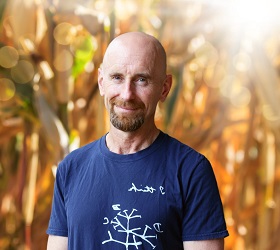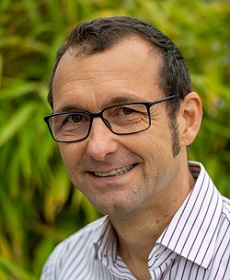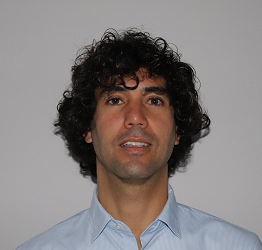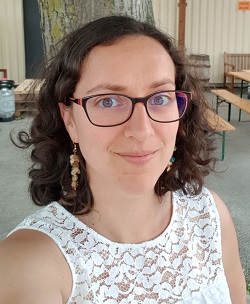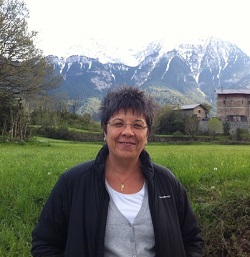|
|
|
Invited Speakers
Mark Cooper - Deputy Director (Research) ARC Centre of Excellence for Plant Success Professor Cooper is the Deputy Director for the ARC Centre of Excellence for Plant Success in Nature and Agriculture. His main research interests combine theoretical, simulation and experimental investigations to formalise the use of prior knowledge of trait genome-to-phenome architecture to design breeding strategies that can deliver accelerated crop genetic improvement for quantitative traits. One example is the use of crop growth models in combination with genomic prediction to account for the impact of genotype-by-environment interactions.
John Hickey - Head of Corn Product Design, Bayer Crop Science John Hickey trained as a quantitative geneticist with specialization in animal breeding in Edinburgh and Wageningen. He undertook postdoctoral research in Australia and Mexico in the application of genomic selection to crops and livestock. Thereafter he held a faculty position at the University of Edinburgh for 8 years. In October 2020 he joined Bayer Crop Science as Head of Corn Product Design.
Andreas Hund - Senior scientist, Crop Science at ETH Zurich Andreas Hund is senior scientist in the group of Crop Science at ETH Zurich. He aims to develop high-throughput field phenotyping methodologies to enhance the genetic gain of yield and yield stability of wheat. The specific aims are i) to achieve a deeper understanding of the genetic control of developmental processes during critical phases of crop development and ii) to develop phenotyping methodologies and genetic crop models to predict the performance of new breeding lines depending on the target environment and climate scenario. To achieve this, two lines of research are followed: i) continuous phenotyping of wheat throughout its development using the Field Phenotyping Platform (FIP) and the Phenofly infrastructure and ii) close collaboration with breeders to close the gap between crop physiology and applied breeding.
Julio Isidro y Sánchez - CsBGP Member, Center of Biotechnology and Genomics, Madrid Julio Isidro y Sánchez is a member of the Computational Systems Biology and Genomics (CsBGP) at the Center of Biotechnology and Genomics in Spain, Madrid. He is leading the research group Crop Genomics and Breeding Methods lab. His research focuses on cutting edge technologies encompassing molecular -omics, statistics and breeding to research strategies that contribute to the development of superior crop varieties. Our focus involves genomic prediction and selection, association mapping and characterization of allelic diversity.
Emilie Millet - GAFL Member, Avignon France Emilie Millet was trained in agronomy and plant breeding at l’Institut Agro in Montpellier, France. She obtained her PhD at the INRAE Laboratory of Ecophysiology for Plants in Stress Environments (LEPSE), Montpellier in 2016. After a post-doc at Wageningen University on statistical methods for phenotyping data, she went back to the LEPSE for a short postdoc on multivariate phenomic data analysis. She is currently a researcher at the INRAE group Genetics and Breeding of fruit and vegetables (GAFL) in Avignon, France, working on tomato breeding. Her primary research interest focuses on integration of methods and data at different scales to identify the determinisms of plant responses to change in climate.
Miguel Pérez-Enciso - ICREA Professor, Centre for Research in Agricultural Genomics, Barcelona Most of the genes that are of socioeconomic importance, e.g., genes affecting disease susceptibility or that makes Iberian pig meat taste good, are very difficult to find because they are influenced by many genes of small effect. My main area of research is to develop statistical and computational tools that help us to identify these genes and/or to use their statistical signals in genomic prediction. My current interests include the application of machine learning technologies to genomics in livestock, humans and plants, the use of sequence data for genomic selection, and software development. I wish to study how algorithms can generate highly complex distributions such as images, shapes, behaviors or microbial abundances.
Zulma G. Vitezica - Institut National Polytechnique of Toulouse Professor Zulma G. Vitezica graduated in Universidad de Buenos Aires and got her PhD in Institut National Agronomique Paris-Grignon. She is Professor of Animal Breeding and Quantitative Genetics at Institut National Polytechnique de Toulouse. Her research includes genetic evaluation and genomic prediction in animal and plant breeding, in particular considering non-additive effects, and is rooted in a network of collaborators across several countries.
|

